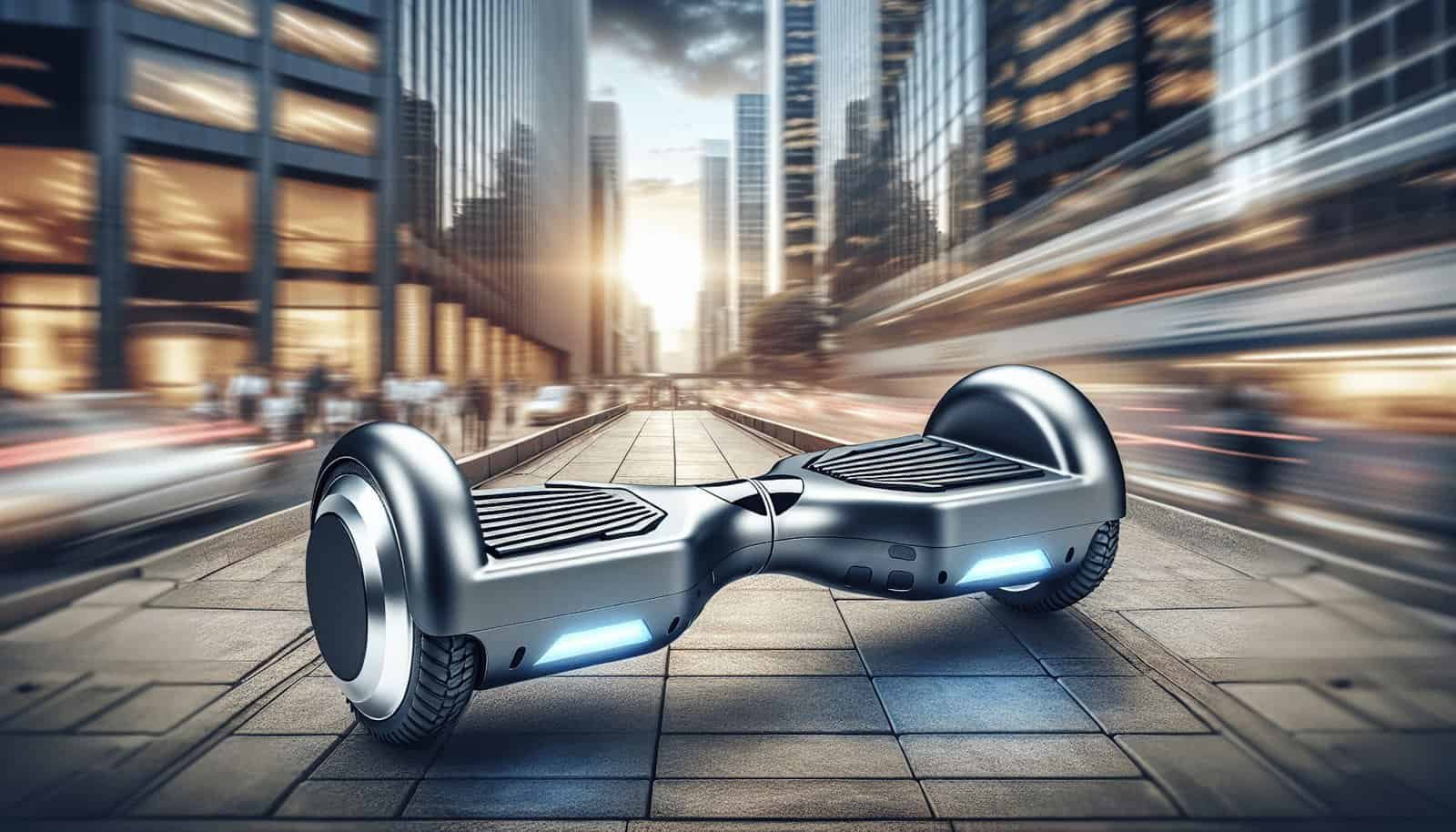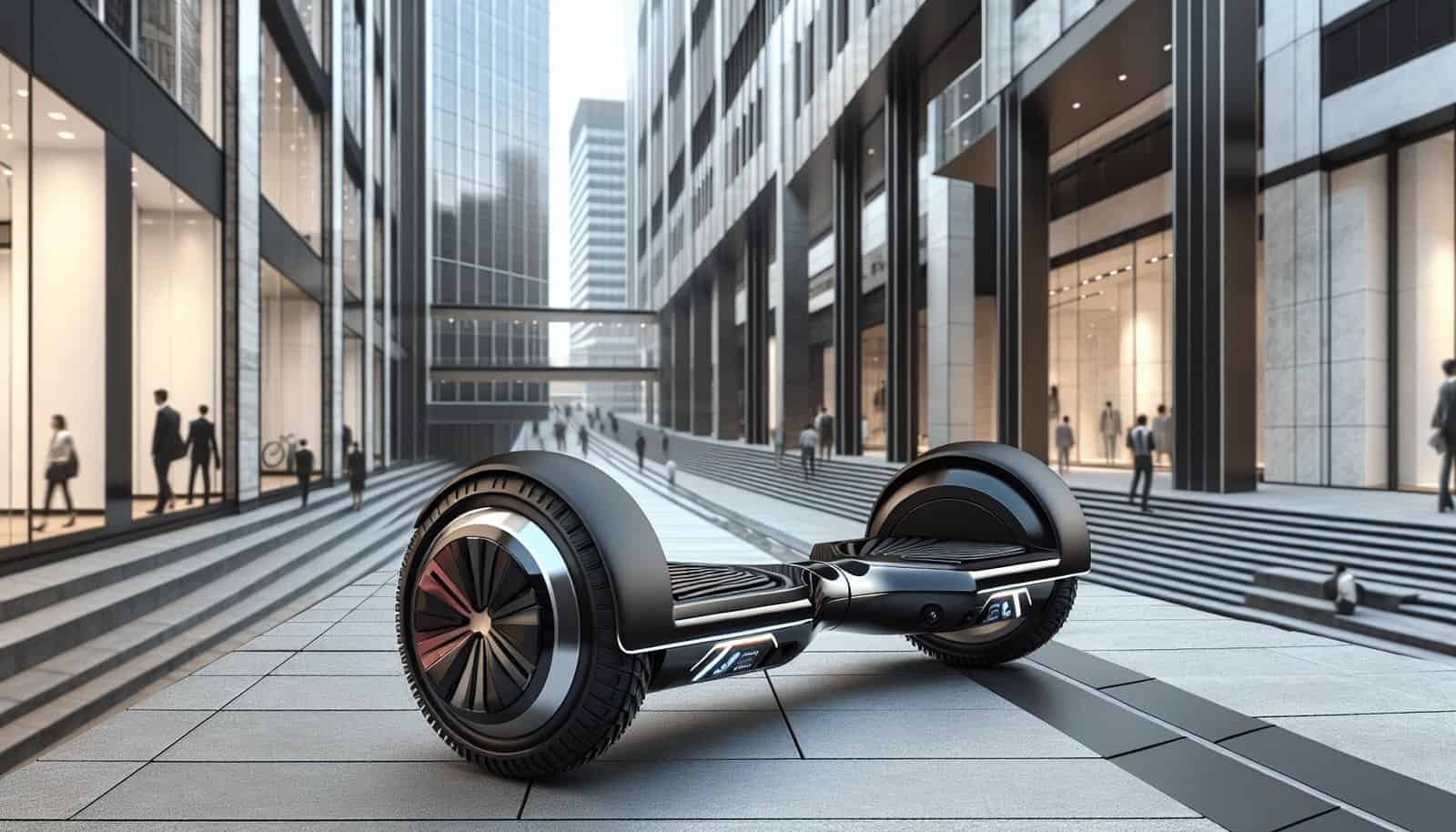Have you ever thought about the possibility of using a hoverboard for your daily commute to work? It might seem like a novel idea at first, but there are several factors to consider when evaluating whether a hoverboard is a practical and efficient commuting option and whether you can store it conveniently at your office.

Hoverboards: What Are They?
Hoverboards are self-balancing scooters powered by electric motors. They have two wheels and a platform on which you stand. By shifting your body weight, you can control the speed and direction of the hoverboard. While they are often seen as toys or gadgets for fun, hoverboards have started being considered as a potential option for commuting.
History of Hoverboards
Hoverboards gained popularity in the mid-2010s and quickly became a sensation. Their rise was fueled by their futuristic appeal and the promise of convenient, fun transportation. Initially, there were concerns about safety, particularly with batteries, but advancements have made modern hoverboards more reliable and efficient.
Types of Hoverboards
There are various types of hoverboards available in the market, ranging from basic models to those with advanced features. Here is a table showing the general types:
| Type | Features | Battery Life | Speed Range |
|---|---|---|---|
| Basic Hoverboards | Simple design, fewer features | 1-2 hours | 6-8 mph (10-13 km/h) |
| Advanced Hoverboards | Bluetooth, LED lights, smartphone integration | 2-4 hours | 8-10 mph (13-16 km/h) |
| Off-road Hoverboards | Larger wheels, better stability on rough terrain | 1-3 hours | 6-9 mph (10-15 km/h) |
Benefits of Using a Hoverboard for Commuting
Using a hoverboard for commuting might not be the traditional choice, but it comes with several potential benefits.
Eco-Friendly Transportation
Hoverboards are electric and produce zero emissions, making them an environmentally friendly option compared to cars and motorcycles.
Cost-Effective
Once you invest in a hoverboard, the ongoing costs are minimal. Electricity is cheaper than fuel, and hoverboards require less maintenance.
Avoid Traffic Jams
Hoverboards allow you to bypass congested traffic, offering a direct route to your destination. This can save valuable time during rush hours.
Fun and Engaging
Hoverboarding can be enjoyable and adds a fun element to your daily routine. It’s a unique way to start and end your day on a good note.
Challenges of Using a Hoverboard for Commuting
Despite their advantages, there are challenges and limitations to using hoverboards for commuting.
Limited Battery Life
Hoverboards typically have a battery life ranging from 1 to 4 hours, depending on the model. Long commutes may require frequent recharging or carrying a charger with you.
Weather Dependence
Hoverboards are not suited for all weather conditions. Rainy or snowy weather can affect their performance and reduce safety.
Legal Restrictions
Some cities or regions have regulations against riding hoverboards on sidewalks, streets, or in certain areas. It’s essential to be aware of local laws before deciding to commute with a hoverboard.
Safety Concerns
While modern hoverboards are safer than early versions, there is still a risk of accidents. Wearing protective gear, such as helmets and knee pads, is recommended to minimize injuries.
Practical Considerations for Commuting With a Hoverboard
Before deciding to use a hoverboard as your primary mode of commuting, consider these practical aspects.
Distance and Terrain
Assess the distance of your commute and the type of terrain you will be traveling on. Hoverboards work best on smooth, flat surfaces. Longer distances may require mid-trip recharging.
Battery Capacity
Choose a hoverboard with a battery capacity that matches your commuting distance. Consider models with higher range if your commute is longer.
Charging Facilities
Determine if your workplace provides charging facilities or if you need to carry your charger. Some hoverboards come with detachable batteries, making it easier to charge them separately.

Storing a Hoverboard at the Office
Storage is an essential aspect to consider when bringing a hoverboard to work. Here are some tips to manage this effectively.
Space Availability
Check if your office has designated storage areas where you can securely keep your hoverboard. Discuss with your employer or facilities manager if necessary.
Security Concerns
Hoverboards can be expensive, so it’s crucial to store them in a secure place to avoid theft or damage. A personal locker or a secured storage room can be ideal.
Charging Permissions
Ensure you have permission to charge your hoverboard at the office. It’s always a good idea to check with your employer about policies regarding personal electronic devices.
Choosing the Right Hoverboard for Commuting
Picking the right hoverboard for commuting involves several factors. Here are a few to consider:
Weight and Portability
If you need to carry your hoverboard, opt for a lightweight, portable model. Some hoverboards are bulkier due to larger batteries and motors.
Speed and Range
Choose a hoverboard that matches your speed preference and commuting range. Higher-end models offer better speed and range but might be more expensive.
Safety Features
Look for hoverboards with safety features like LED lights, non-slip footpads, and UL certification for battery safety. Additional features like balance assistance can also enhance your safety.
Price
While you might be tempted to go for cheaper models, investing in a good quality hoverboard can save you from frequent repairs and replacements. Compare various options and read reviews before making your purchase.

Real-life Experiences and Testimonials
Hearing from others who use hoverboards for commuting can provide valuable insights. Here are a couple of testimonials:
John, a Software Engineer: “I started using a hoverboard to commute about a year ago. It’s fun and saves me a lot of time, especially since I live in a busy city. The only downside is rain, which forces me to take public transport.”
Emily, a Marketing Executive: “My office is just 2 miles from my home, and using a hoverboard has been great. However, I had to discuss with my employer regarding charging it at work. Thankfully, they were accommodating.”
Alternatives to Hoverboards
If you’re not entirely convinced about using a hoverboard, there are other personal commuting options to consider.
Electric Scooters
Electric scooters are becoming increasingly popular and offer similar benefits to hoverboards but with a more familiar design. They generally have better range and stability as well.
Electric Bikes
Electric bikes combine the benefits of traditional cycling with electric assistance for a more comfortable commute. Although bulkier than hoverboards, they are well-suited for longer commutes.
Foldable Bicycles
For those who prefer a manual option, foldable bicycles offer convenience and portability. They can be easily stored and do not require charging.

Preparing For Your Hoverboard Commute
If you decide that hoverboarding is right for you, some preparation can help make your commute seamless:
Learn and Practice
Before hitting the road, spend time learning how to ride your hoverboard safely. Practice in a safe, open area until you feel confident.
Safety Gear
Invest in quality safety gear, including a helmet, wrist guards, knee pads, and elbow pads. These can significantly reduce injury risk.
Plan Your Route
Identify the best route for your commute, considering factors like smooth surfaces, less traffic, and legal riding areas. A well-planned route can make your commute safer and more enjoyable.
Frequently Asked Questions (FAQs)
Here are some common questions and answers about using hoverboards for commuting:
Is it legal to ride a hoverboard on the street?
Laws and regulations vary by country and city. Always check your local regulations regarding where you can legally ride a hoverboard.
How do I maintain my hoverboard?
Regular maintenance includes keeping the hoverboard clean, checking for tire wear, and ensuring the battery and electrical components are in good condition. Refer to the manufacturer’s guidelines for specific maintenance tips.
Can hoverboards be used in inclement weather?
Hoverboards are generally not recommended for use in rain, snow, or extreme weather conditions as it can affect their performance and increase the risk of accidents.
How long does it take to charge a hoverboard fully?
Charging times vary depending on the model and battery capacity but generally range from 2 to 4 hours for a full charge.
Can I take my hoverboard on public transport?
This depends on the rules of your local public transport system. Some systems allow hoverboards if they are carried like luggage, while others may have restrictions.

Conclusion
Using a hoverboard for commuting can be a fun, cost-effective, and eco-friendly option if you take into account the various aspects discussed in this article. Consider the benefits and challenges, understand the practicalities, and ensure your hoverboard is stored securely at the office. Whether it’s the distance of your commute, weather conditions, or local regulations, planning and preparation can make your hoverboard commute a success.
Ultimately, the decision to use a hoverboard for commuting depends on your personal situation and preferences. If you find that it suits your lifestyle and provides convenience, then it can be an enjoyable and efficient way to get to work each day.

